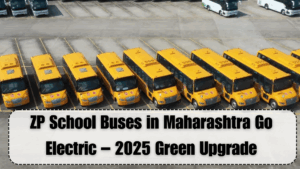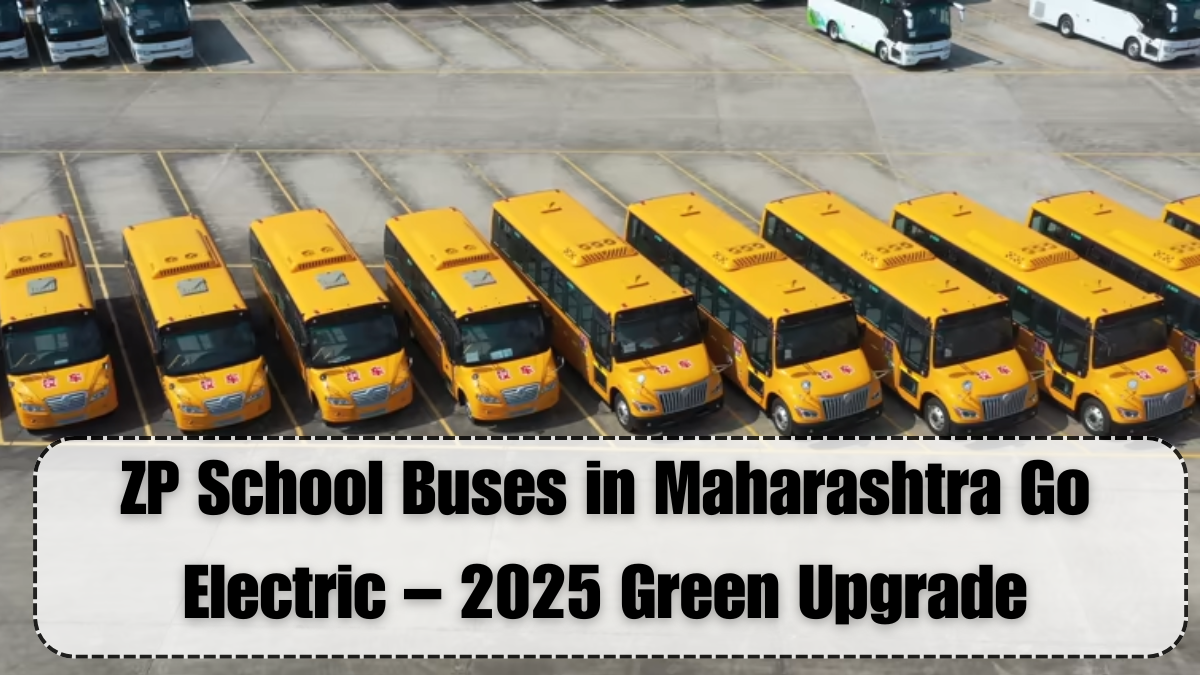In 2025, the face of rural school transportation is changing. Across multiple districts in Maharashtra, school bus electrification has begun in full force under a government-led initiative to promote sustainable student travel. Zilla Parishad (ZP) schools have rolled out fleets of electric school bus units that now transport thousands of students daily—quietly, efficiently, and without polluting the environment.
This clean drive isn’t limited to urban centers. Rural areas such as Beed, Satara, and Jalna are now actively transitioning their ZP fleet to electric models. The buses are operated under a cost-sharing agreement between local education departments and private EV manufacturers, ensuring smooth, budget-friendly execution. The result? Safer, greener, and more cost-effective transportation for children in even the remotest villages.

Solving Old Problems with New Technology
Before this initiative, most Zilla Parishad schools relied on aging diesel vans or private autos that were both costly and unreliable. These outdated vehicles often broke down, created high emissions, and posed safety risks. With the introduction of school bus electrification, Maharashtra has solved multiple challenges at once—cutting down on fuel costs, ensuring punctuality, and reducing carbon footprints.
Each electric school bus in the new ZP fleet is equipped with GPS tracking, CCTV cameras, and battery ranges of up to 120 km per charge. This allows uninterrupted service across widespread village routes. Charging stations have been set up at school depots, some of which are powered by solar energy, reducing operational costs even further.
Comfort, Safety, and Student Engagement
Teachers, parents, and students have already started to experience the benefits of this clean drive. These new buses are quieter, smoother, and emit zero tailpipe pollution—improving air quality around school campuses. Drivers report that the buses are easier to control, while students enjoy features like ventilated seating and wide windows for a more comfortable ride.
More importantly, these electric school bus rides have become a platform for environmental education. Posters about EV technology and green energy now adorn the bus interiors, and children are encouraged to share facts about pollution and sustainability during their commute. This daily exposure is helping embed environmental awareness into the culture of ZP schools.
Government Support and Local Involvement
The school bus electrification plan was backed by the Maharashtra State EV Policy and received additional support from Panchayat Samitis and local governance bodies. By subsidizing up to 60% of the vehicle costs and offering tax incentives, the government made it easier for ZP schools to invest in their own buses.
Local mechanics have also been trained to maintain electric school bus units, creating job opportunities and ensuring that the ZP fleet remains in top condition. Community response has been overwhelmingly positive, with many parents expressing relief that their children now travel in safe, modern, and eco-friendly vehicles.
A Blueprint for Other States
What started as a pilot in three districts has now become a model for school transportation across Maharashtra. The success of the clean drive has inspired other states to study the model and explore their own EV transitions. The initiative shows how focused planning, local engagement, and clean technology can reshape not only how children commute—but also how communities think about progress.
With school bus electrification, Zilla Parishad schools are no longer just places of learning—they’re champions of green change, showing that even rural systems can lead the way in sustainable development.
Summary Table – ZP Electric School Bus Upgrade 2025
| Feature | Description |
|---|---|
| Zero-Emission Fleet | Diesel buses replaced with clean, quiet electric school buses |
| Budget & Policy Support | State subsidies and EV policy aid for school transportation |
| Charging Infrastructure | Installed at schools with solar backup for consistent power |
| Safety and Comfort | Buses feature GPS, cameras, wide seats, and air ventilation |
| Eco-Education Integration | Green awareness promoted through visuals and onboard student activities |
FAQs
What is school bus electrification in Maharashtra?
School bus electrification refers to the replacement of diesel-powered school buses with electric vehicles to reduce pollution and improve student transport in ZP schools.
What makes electric school buses better for students?
Electric school bus models are quieter, safer, more comfortable, and emission-free, creating a healthier commute for students.
How is the ZP fleet being funded?
The ZP fleet transition is supported through state EV subsidies, district funds, and partnerships with electric bus manufacturers.
Are rural areas included in the clean drive?
Yes, rural districts across Maharashtra are a core part of this clean drive, with buses serving remote village schools and tribal regions.
Is this model being adopted elsewhere?
Following the success in Maharashtra, several other Indian states are studying the school bus electrification model for similar implementation.
Click here to know more.
